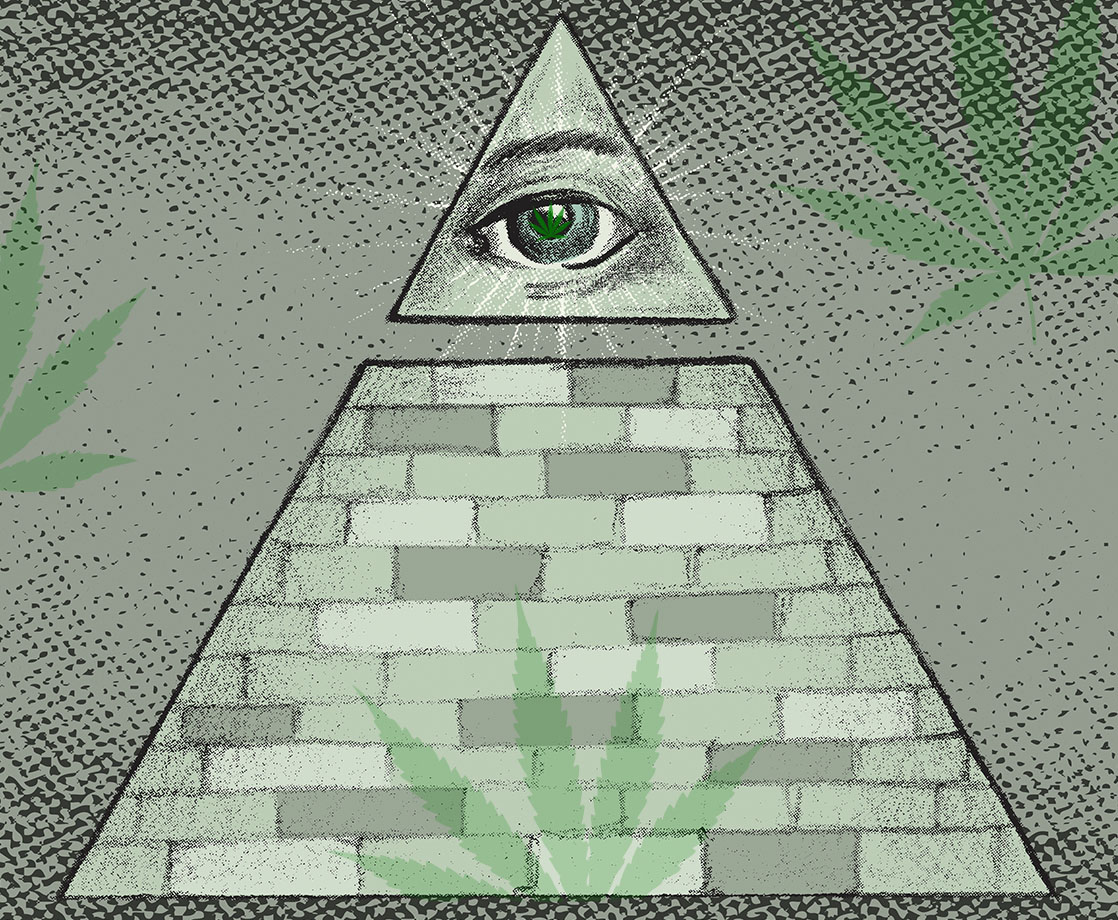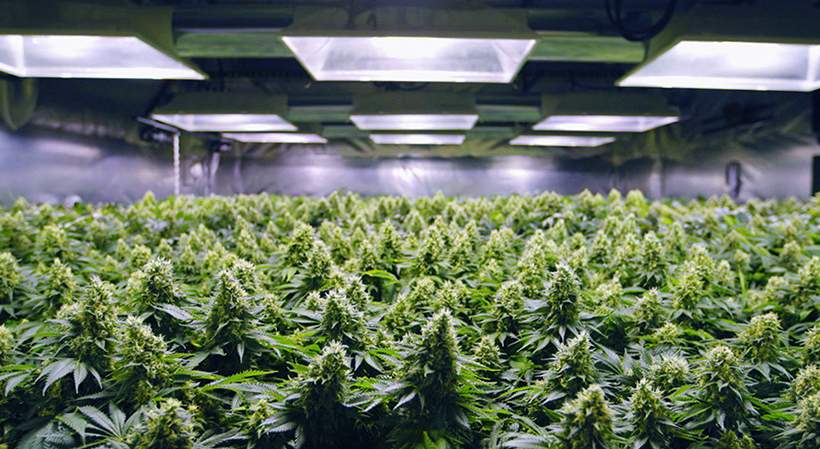Conspiracy Kush is a strain of indica with a citrusy aroma, peppery aftertaste, and name that references the crossover between conspiracy and stoner cultures. From the paranoid pothead trope (also the name of a Cheech and Chong song) to stoner dog memes with text like “Fog Outside…Government Experiment,” there’s a well-documented association between smoking weed and entertaining anti-establishment theories of insidious forces colluding behind closed doors.
Take the hemp conspiracy evangelized by many old stoners, which posits federal prohibition of the cannabis plant was engineered by newspaper baron William Randolph Hearst (the mogul Citizen Kane is based on) in collusion with the Dupont family to suppress the competition hemp posed to the plastic and timber industries. The theory, popularized by marijuana activist and pipe salesman Jack Herer in his self-published book The Emperor Wears No Clothes, notes that in the mid-1930s new stripping machines which conserved hemp fiber’s high-cellulose pulp became state of the art, available, and affordable. A 1938 article in Popular Mechanics Magazine hailed hemp as the “new billion-dollar crop” and “the standard fiber of the world” used to produce more than 5,000 textile products and with the potential to produce 25,000 products from dynamite to Cellophane. According to Herer, hemp was a big threat to wood-pulp paper, which Hearst had allegedly invested in, and nylon, which Dupont invented in 1935.

A 1938 article on the benefits of hemp, published in 'Popular Mechanics Magazine'
So the story goes, Andrew Mellon, the Secretary of the Treasury who supposedly had significant investments in the DuPont Company, and Harry Anslinger, commissioner of the Federal Bureau of Narcotics, who was apparently appointed by Mellon (he was Anslinger’s wife’s uncle), were also in on the plot, too. Critics have poked holes in the hemp conspiracy, pointing out, for instance, that there is little evidence Hearst had significant investments in the timber industry. As a newspaper baron, and therefore a buyer of paper product, he was more likely to benefit than lose out from competition between wood-pulp paper and hemp paper. Other parts of the legend, however, are undeniable.
Anslinger authored the 1937 Marihuana Tax Act, which imposed a tax on the sale of hemp and marijuana, and propelled a racist campaign against the drug, linking it to homicidal mania, suggesting its principal users were black people and Latino immigrants, and insinuating its effects included minorities forgetting their place in American society. Anslinger warned of what happens when black male college students share joints with white female students. After “smoking and getting their sympathy with stories of racial persecution,” he concluded the result would be “pregnancy.” Hearst helped spread fear-mongering anti-marijuana propaganda in his newspapers.

A Marihuana Tax Act of 1937 stamp via
There’s a reason we often find marijuana at the center of conspiracy theories. “Any sort of legal prohibition leads to conspiracy theories about who really promoted the law and who really benefits from it,” explained Kathryn Olmsted, an assistant professor in the history department at University of California, Davis in an email exchange with MERRY JANE. “Moreover, I think that any time you have widespread defiance of a law, then you get more antigovernment conspiracy theories. If the government invests a lot of resources in enforcing a widely-ignored law, then the government loses credibility in all areas.” As state governments begin to reconsider prohibition, the context around these stoner conspiracy theories changes. As the trend toward legalization continues, it’s looking like the War on Drugs might be in its twilight years. Still, it’s worthwhile thinking about what motivated the crusade in the first place.
While the evidence behind the hemp conspiracy is mostly circumstantial, we do know that in the contemporary context corporate interests like private prisons and big pharma do influence marijuana prohibition through their powerful lobbies, so it doesn’t seem that far-fetched that wealthy industrialists could have influenced the laws’ formation. And even if we can’t prove Hearst had an economic interest via hemp in spreading anti-marijuana propaganda, it’s clear that from the start America’s laws against drugs, the narratives that made them palatable to the public, and their uneven application have been racist. Could we argue then that these laws are a conspiracy against people of color?
Olmsted clarifies conspiracy as being when “two or more people get together to plot something illegal or abusive.” According to this definition, she argues systemic racism is not a conspiracy because it’s out in the open. The formation of racist policies and discussions of their true motivations, however, do happen behind closed doors. John Ehrlichman, a former Richard Nixon aide, admitted that the Nixon administration “associated the hippies with marijuana and blacks with heroin, and then criminaliz[ed] both heavily” to vilify the anti-war movement. “Did we know we were lying about the drugs?” he added. “Of course we did.” So there are instances when powerful people conspire against communities of color in secret, but there are other instances where, without a conscious plot, the result is the same; the racist status quo is upheld.

Anti-marijuana propaganda created by Anslinger's Narcotics Bureau
Legalization is one example. The parties lobbying for marijuana to be permitted either medicinally or recreationally aren’t conspiring against communities of color, but there’s a racial element to the shift going on, which Michelle Alexander, professor of law and author of The New Jim Crow, has drawn attention to. “In many ways, the imagery doesn’t sit right. [Today there] are white men poised to run big marijuana businesses dreaming of cashing in big — big money, big businesses selling weed. After 40 years of impoverished black kids getting prison time for selling weed, and their families and futures destroyed, now white men are planning to get rich doing precisely the same thing?” she explained in March 2014 in a public conversation with Asha Bandele of the Drug Policy Alliance. Alexander notes that while she’s thrilled the War on Drugs seems to be coming to an end, the destructive impact it had needs to be addressed. “You need to be willing to deal with the truth, deal with the history openly and honestly.”
As legalization starts to spread from state to state, antigovernment conspiracy theories regarding prohibition seem less relevant, but the impact of these policies is still affecting the uneven playing ground for marijuana entrepreneurs. And the intentions behind these policies is still shrouded, leaving us to speculate. At the same time, as the trend of legalization continues, other conspiracy theories are emerging in the vacuum left by speculations about prohibition.
Far-right radio host and InfoWars founder Alex Jones, for instance, has been spreading antiglobalist paranoia positing that George Soros is behind legalization, as well as stronger “weaponized,” “genetically-engineered” weed. First in court, during a custody battle with his ex-wife over the couple’s children, he was asked to explain his drug and alcohol use, and then later on his radio show, Jones explained he smokes marijuana once a year, like a cop, to monitor its strength. He claims from this personal experience that the drug has gotten stronger over the years. It’s far more potent than the pot he smoked in high school. “The stuff now — it is like a mule kicks you out,” he ranted.
Although Jones certainly doesn’t embrace stoner counterculture, his position of a far-right conspiracy theorist who sometimes smokes pot and who is vehemently against the War on Drugs challenges easy right-left stereotypes. So does the way the Obama-era Whitehouse shooter Oscar Ortega was portrayed by the media, as a mentally ill individual who smoked weed and watched Alex Jones documentaries. And so did Salon.com, dubbing a robocall campaign about marijuana legalization “the libertarian/marijuana conspiracy to swing the election,” during pre-game coverage of an election which didn’t swing. In 2012, as Colorado was being seen as a swing state for the upcoming federal election, robocalls were made that urged pro-drug legalization voters to support Libertarian candidate Gary Johnson. With the Colorado Democratic party against the marijuana measure, Liberal commenters worried that crunchy yuppies from Denver and Boulder would feel conflicted between voting for Obama and voting for drugs. Hypothetically, the Libertarian and his robocalls would end up siphoning more votes from the Democrat than the Republican, the idea of left and right momentarily scrambled and some left musing, What if the establishment right and the anti-establishment right colluded? Ultimately, though, Obama and Biden won — 51.5% of the popular vote and 9 electoral college votes.
For several decades, 420 culture has been outsider culture. Marijuana activists have mingled in a social space with antigovernment types of all stripes, grizzled hippies who grow their own vegetables and chemtrail believers who build their own cloudbusters. At the same time, identifying as a pothead has meant building your lifestyle around something that’s criminalized for no good reason, thereby opening you up to the idea that things happen for reasons that are not good. But this ecosystem changes to some extent as state after state legalizes the drug. And at the same time, the shape of outsider culture has been shifting too, as Trump’s rise to power has been based in part on a union between the establishment right and anti-establishment right.
A conspiratorial worldview, which appeals to that anti-establishment right, is intimately related to this rise. Remember, Trump’s political career began with his insistence on the birther conspiracy. So at the same time that marijuana is becoming more mainstream, a conspiratorial worldview is becoming less fringe, too. But the relationship between the two is changing. When weed isn’t the same gateway into questioning government authority, and government authority is based on a destabilization of fact-based knowledge, the truth remains you shouldn’t trust the state.
Follow Whitney Mallet on Twitter and visit her website for more











